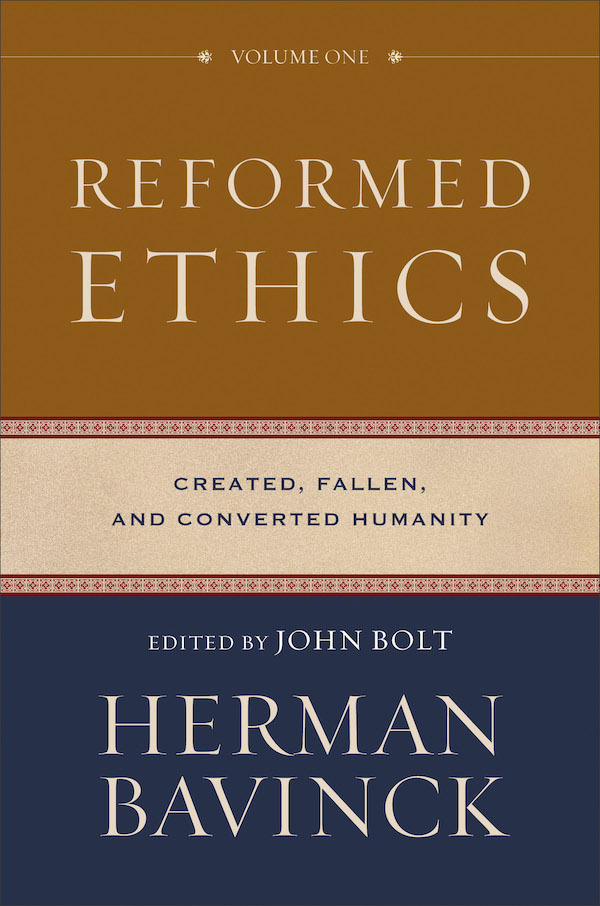Baker Academic has published the first English translation of a nearly forgotten book. For 100 years (since 1921), Herman Bavinck’s 1,100-page manuscript remained at the Bavinck Archives (Vrije Universiteit) until Dirk van Keulen rediscovered it in 2008.
As John Bolt records, “Readers of this volume are, therefore, among the privileged first group to gain access to Bavinck’s systematic reflection on theological ethics since his own students who heard the lectures in the last two decades of the nineteenth century” (ix).
As the historical level, reading Reformed Ethics represents something of a privilege to read. In terms of editing, John Bolt has done an excellent job formatting and providing explanatory footnotes throughout the work. And lastly, when it comes to the argument, Bavinck’s Reformed Ethics ably sketches out a consistent Reformed view of, as the subtitle suggests, created, fallen, and converted humanity.
Overview
This is volume one of three (ix). And in this work, two major topics divide the volume: humanity before conversion and converted humanity. Within these two halves, Bavinck discusses human nature, the power of sin, sins against God and neighbour, the fallen image of God, the conscience, the law, life in the Spirit, the Christian life, perseverance, pathologies for the Christian life, and the consummation of the Christian life.
Argument
Bavinck contributes to a number of still-live conversations in the church today. For example, he writes with some clarity on the topics of natural law and conscience. In the first place, he understands God’s forbearance to be a manifestation of common grace. Through this forbearance, God gives grace to all which has the effect of retaining “something of what we by nature possessed in Adam” (1:149).

He continues, “It is in this sense that we also speak of natural theology, natural morality, and natural law. Even though we retain them only as gifts, they are remnants, graciously left behind for us, of what we once possessed by nature” (1:149). Natural theology, natural morality, and natural law fall under God’s forbearance and patience (1:149).
Natural law, in particular, allows the conscience to judge between right and wrong. It can judge between the two because God’s law is written on the hearts of all people (Rom 2:15). Bavinck explains:
“Moreover, we still possess conscience, which supplies our judgment about ourselves in (connection with) our relationship to God, according to the law of God, according to the right practical reason implanted in us at our creation. Therefore, the conscience does not encompass the law of God within itself, but forms a judgment in accordance with that law of God which lies elsewhere (in the heart)” (1:194).
So conscience, which is not a distinct faculty but part of the intellect (1:195), judges according to the law of God. And it can do so because the law is written on the heart.
He dials down further on the topic by defining the law of conscience, or the syntērēris. Bavinck writes, “Syntērēris is a natural habit of concrete activity that contains the principles of practice or practical reason. The law of nature is the content by which the conscience evaluates our deeds. Conscience needs a law to evaluate acts; the syntērēris is that law” (1:195–196).
The syntērēris precedes conscience and is necessary and a precondition for the conscience to judge (1:196). “To say that it is not itself part of the conscience,” writes Bavink,” is to say that the law by which the conscience judges does not lie in the conscience itself but, as Romans 2:15 teaches, in the heart, in practical reason” (1:196). The heart is not the law either but the tablet (1:196).
More could be said here. But it is important to note that Bavink provides detailed arguments throughout his work on ethics. He also pulls from a wide-swathe of Reformed works and even Thomas Aquinas whom he cites approvingly (1:193, 194).
Evaluation
Bavinck had not published Reformed Ethics during his time. He could have. The book feels complete. The editor John Bolt has also done an excellent job in making a smooth translation with copious notes throughout that help the reader.
At this point, it may not be exactly fair to evaluate Bavinck as a thinker. He has already entered into the category of Reformed history. Yet I will venture to say that his command of sources and clarity in argumentation will help even those uninterested in the history of dogma to consider Reformed Ethics for today.
I recommend Reformed Ethics to Christian leaders, those interested in ethics, and those interested in the history of Reformed thought.
Disclaimer: the publisher provided me a review copy.
Discover more from Wyatt Graham
Subscribe to get the latest posts sent to your email.
Hello Wyatt; I purchased the first volume of Ethics by Bavink a few weeks ago. Why would indexes like the ones in Gods Wonderful Works not be included?
no idea! but that sounds like it would have been a good idea!